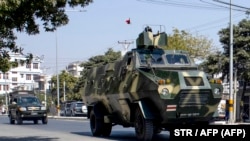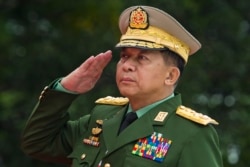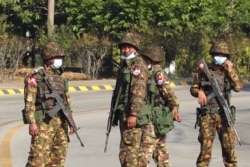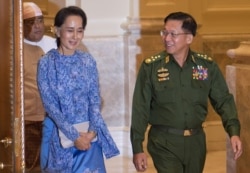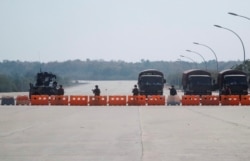On February 1, the military in Myanmar staged a coup, taking control over the country.
Known as the Tatmadaw, the armed forces seized Myanmar’s infrastructure, and suspended media, telephone and internet services as well as financial institutions and international flights. Simultaneously, the Tatmadaw detained civilian leaders and announced the transfer of legislative, judicial and executive powers to army Commander-in-Chief Gen. Min Aung Hlaing.
The military-owned Myawady TV station claimed on February 1 that the takeover was justified because the government did not act on the Tatmadaw’s rejection of last year’s election results, which it claimed were fraudulent.
The army-affiliated Union Solidarity and Development Party overwhelmingly lost the November 8 elections to the ruling National League for Democracy Party (NLD). Observers said there were a few minor irregularities but nothing that would affect the lopsided outcome.
Responding to international condemnation of the military takeover, the Tatmadaw issued a statement saying there was no coup – just a move to protect democracy:
“The Tatmadaw categorically denies it is impeding Myanmar’s democratic transition,” the military’s statement said, while “urging some diplomatic missions not to make unwarranted assumptions about the situation.”
In fact, by taking over the country, the Tatmadaw is impeding the post-election transition on dubious constitutional authority.
A Tatmadaw order published on Myawady TV’s web portal declared a nationwide one-year state of emergency it claimed was “in accordance” with Myanmar’s constitution, citing Articles 417 and 418.
“[I]t is the Tatmadaw’s undeniable duty to exercise Article 417 of the Constitution to declare ‘State of Emergency’… to utilize Article 418, which mandates the transferring of ‘Legislative, Judicial and Executive Powers’ to the Commander-in-Chief of the Defense Services.”
But that is questionable. According to the constitution, the authority to take emergency actions belongs to Myanmar’s president, not the military.
Article 417 states: “If there arises or if there is sufficient reason for a state of emergency to arise that may disintegrate the Union or disintegrate national solidarity or that may cause the loss of sovereignty, due to acts or attempts to take over the sovereignty of the Union by insurgency, violence and wrongful forcible means, the President may, after coordinating with the National Defense and Security Council, promulgate an ordinance and declare a state of emergency.”
Article 418 states: “In the matter concerning the declaration of the state of emergency according to Section 417, the President shall declare the transferring of legislative, executive and judicial powers of the Union to the Commander-in-Chief of the Defense Services to enable him to carry out necessary measures to speedily restore its original situation in the Union.”
According to local and international media reports, Myanmar’s President U Win Myint did not invoke Articles 417 and 418. In fact, he was detained by the military along with State Counselor Daw Aung San Suu Kyi, the country’s de facto leader, and other National League for Democracy officials.
“It is outrageous that the military interprets the 2008 Constitution as they wish,” Bo Kyi, Secretary of the Assistance Association for Political Prisoners NGO in Myanmar, told the Voice of America. He said there was no significant political instability in the country that would justify the military moving to declare a state of emergency.
Myanmar, previously known as Burma, gained independence from British colonial rule in 1948, but remained under military control for decades after its army staged a first coup in 1962.
In 1988, Suu Kyi, the daughter of an independence hero, returned from exile and started a democratic movement. The ruling junta killed hundreds of pro-democracy protesters and put Suu Kyi under house arrest.
The military refused to hand over power after the Suu Kyi-founded National League for Democracy Party won elections in 1990. In 1991, Suu Kyi was awarded a Nobel Prize for her democracy efforts. In 2010, after nearly two decades, she was freed from the house arrest.
Suu Kyi won a seat in the parliament two years later, and in 2015 her party won Myanmar’s general elections. Still, the military drafted a constitution that bars Suu Kyi from the presidency and gives significant power to the army.
By Tuesday (February 2), news reports from Myanmar confirmed the detention of hundreds of lawmakers and activists across the country.
Suu Kyi is back under house arrest. It is unknown if she is allowed to communicate with the outside world or her fellow politicians inside Myanmar.
"Prominent activists were also arrested. My mother was arrested at home in Myeik at 5:30 in the morning. There are police patrols and military security personnel deployed throughout Myeik," Bo Kyi of the Assistance Association for Political Prisoners told VOA’s Burmese service. His mother, Daw Yee Yee Cho, planning and finance minister for the Tanintharyi Region in Myanmar's south, was arrested along with the entire regional cabinet, Bo Kyi said.
The National League for Democracy expressed hope for a peaceful solution. A party lawmaker and former political prisoner, Bo Bo Oo, told the Associated Press news agency that the party is not currently planning street protests, but is exploring legal options to take power back from the military.
“We are working to settle the problem peacefully,” he said. “Right now, we are not planning for a big protest. But we have to practice some form of civil disobedience.”
U.S. President Joe Biden said in a statement Monday (February 1) that the United States would immediately review sanctions on Myanmar and take "appropriate action," following the recent developments.
U.N. Secretary-General Antonio Guterres urged Myanmar’s military leadership to resolve any differences through peaceful dialogue.
The European Union, Britain, Australia, India and Singapore all expressed concern about the situation in Myanmar.




